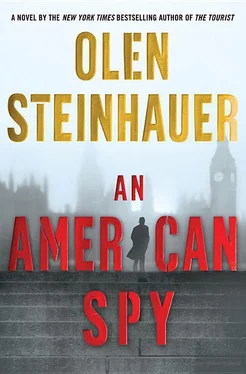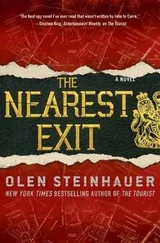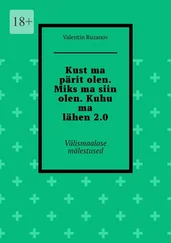Olen Steinhauer - An American spy
Здесь есть возможность читать онлайн «Olen Steinhauer - An American spy» весь текст электронной книги совершенно бесплатно (целиком полную версию без сокращений). В некоторых случаях можно слушать аудио, скачать через торрент в формате fb2 и присутствует краткое содержание. Жанр: Шпионский детектив, на английском языке. Описание произведения, (предисловие) а так же отзывы посетителей доступны на портале библиотеки ЛибКат.
- Название:An American spy
- Автор:
- Жанр:
- Год:неизвестен
- ISBN:нет данных
- Рейтинг книги:3 / 5. Голосов: 1
-
Избранное:Добавить в избранное
- Отзывы:
-
Ваша оценка:
- 60
- 1
- 2
- 3
- 4
- 5
An American spy: краткое содержание, описание и аннотация
Предлагаем к чтению аннотацию, описание, краткое содержание или предисловие (зависит от того, что написал сам автор книги «An American spy»). Если вы не нашли необходимую информацию о книге — напишите в комментариях, мы постараемся отыскать её.
An American spy — читать онлайн бесплатно полную книгу (весь текст) целиком
Ниже представлен текст книги, разбитый по страницам. Система сохранения места последней прочитанной страницы, позволяет с удобством читать онлайн бесплатно книгу «An American spy», без необходимости каждый раз заново искать на чём Вы остановились. Поставьте закладку, и сможете в любой момент перейти на страницу, на которой закончили чтение.
Интервал:
Закладка:
Wu Liang spoke up. “So what do you suggest, Sun Bingjun?”
“I’m suggesting nothing. I’m only pointing out that, if the visit of this agent is really a sign that a CIA department is engaging in some operation on Chinese soil, then the reasons are far more complicated than a hatred of Xin Zhu here, or even of Chinese intelligence.”
Silence again. Wu Liang seemed temporarily lost in the face of Sun Bingjun’s flawless logic, and Yang Qing-Nian looked embarrassed. Zhang Guo said, “Is there someone we can consult on this? Someone within their agency?”
Feng Yi said, “The Second Bureau has a few CIA sources, but they’re not ranking enough to know about this. Wu Liang?”
Wu Liang set down his teacup. “Possibly. I have one source that may be able to dig deeper.” He took a long breath. “Xin Zhu may be the one to talk to.”
Finally, they looked at him. He chewed the inside of his left cheek. He’d once had a wonderful source, but not anymore-James Pearson, aide to Senator Nathan Irwin. “I will ask,” Zhu said, and bowed his head. “I thank the committee for bringing this troubling news to my attention, and I will do my best to make sure it is explained to everyone’s satisfaction.”
“I’m sure you will,” said Wu Liang. “Further, I hope that when you receive information you will share it with all of us here in the committee. Which brings us to the other subject of this morning’s discussion.”
Yang Qing-Nian shifted in his chair, preparing to speak, but Wu Liang shot him a look. The young man had botched one item already; he would take care of the other one himself.
Wu Liang said, “I think all of us here are familiar with Xin Zhu’s April 15 memo, a copy of which I hold here.” He waved a single sheet of paper. “In it, he stated that the Ministry of Public Security was no longer secure enough to contain his office’s intelligence. Naturally, this committee-the whole committee-demanded more explanation, and on Friday, April 18, the committee received a twelve-page collection of specific pieces of intelligence that, we were told, resided in the files of the Department of Tourism. By triangulating these nuggets of information, Xin Zhu explained, he could reach no other conclusion than that the Department of Tourism itself was running a high-level source within the Ministry of Public Security. Thus, his intelligence would be withheld until the leak was plugged.”
Everyone in the room watched Wu Liang, who continued, “Now, upon receiving the initial memo, I admit that I was skeptical. Xin Zhu and I have often resided in different rooms in the house of socialist philosophy. I saw this as further evidence of his paranoia. Then I examined the twelve-page report and felt less sure of myself. The ministry is, as you all know, close to my heart, and the facts Xin Zhu had collected, when viewed together, shook me deeply. I spent the weekend having very difficult conversations with ministry comrades, and I even viewed some of them with suspicion. Investigations were begun. I was-and I’m hesitant to admit this, but it’s true-in a panic. What if Xin Zhu was right, and we were bleeding information to the Americans? Catastrophe!”
Zhu closed his eyes to listen better. He could feel where this was heading, could hear it in Wu Liang’s exaggerated innocence and emotion. You build a tower in order to tear it down, and the tower Wu Liang was building was enormous.
“By that Monday, four weeks ago, I had a list of suspects. Nineteen. I worried so much, you see, that nearly anything could admit one to that list. Yang Qing-Nian and I began more intense interviews. We took them from their homes, placed them in separate cells on East Chang’an Avenue, and began talking. At this point, there was no reason to treat them as prisoners, so they kept their clothes and were fed and treated well-only their phones were confiscated.
“The interviews, though, were not going well. By Wednesday we had talked to each of them twice, and so I decided to visit Xin Zhu at his office in Haidian and share what little I had. I thought that, as good comrades, we could work together. I was, I now know, mistaken.”
Zhu remembered that day. Wednesday, April 23, 2:00 P. M. Wu Liang and a hard-looking secretary filled the office with foul Russian tobacco smoke, going over his twelve pages one line at a time, fighting over veracity, asking for documentation and demanding the connections that had brought Zhu to suspect the Ministry of Public Security.
“What I learned that day, after hours of rigorously confronting each item in those twelve pages, listening to and then challenging each of Xin Zhu’s explanations, was a simple fact. Each of these items-and there are one hundred and twelve in all-is simply that: an item on a piece of paper. Each is an item connected to a piece of information gathered by his agent, the American senatorial aide, James Pearson. For each he has either an e-mailed report with attachments or a handwritten one, accompanied sometimes by flash drives-all from James Pearson. But where, I found myself asking, is this golden source, this James Pearson? We know the answer. He was picked up by the CIA trying to flee the United States. He is unavailable. And the place where James Pearson found these so-called truths? That would be the office of the Department of Tourism, on West Thirty-first Street, in Manhattan. The department Xin Zhu so hastily destroyed, the offices of which have now been gutted by the CIA. I have photographs of the offices if any of you wish verification.”
He’d talked a long time, but talking had always been Wu Liang’s strong point. He danced with facts and manipulated them to showcase his modesty and erudition. With a mouth like that, and a wife like Chu Liawa, there was no end to what he could accomplish.
But he wasn’t done yet.
“As I say, I entered his office convinced of Xin Zhu’s honesty, ready to make our ministry secure again. I entered contrite, but I left angry. Furious, in fact. I had spent the previous days grilling good comrades on the strength of what now looked to me like a self-serving deception. My anger, however, had not reached its apex, for upon returning to East Chang’an, I was informed that Bo Gaoli, who some of you may know from his sterling history helping to run the counterterrorism department, was dead. Faced with the shame of this unfounded suspicion, he had used his belt to hang himself in his cell.”
Wu Liang let silence speak for him now. The committee knew of Bo Gaoli’s suicide, but the details had never been released. There had been a rumor of a sexual predilection, another of financial indiscretions. No one-certainly not Zhu-had known that he’d been in a ministry cell when he did it. Now that Wu Liang had shared this fact, everyone turned to examine Zhu’s reaction, and he did his best to control himself. Was he successful? He wasn’t sure. He thought that he could ask Shen An-ling later, but his assistant could only see the back of his head.
Xin Zhu wondered if anyone was going to ask the obvious, and obligatory, question: Was it possible that Bo Gaoli’s suicide was an admission of guilt? He himself could not ask it-it was up to someone else, perhaps Zhang Guo. But no one asked anything, and Zhang Guo only stifled a yawn with his cupped hand.
Since no one else seemed interested in speaking, Zhu opened his mouth. “I certainly regret the death of Bo Gaoli, but it does not alter the facts as I read them. The intelligence listed on my report did, in fact, originate in the Department of Tourism, and the only conclusion I can come to is that its source was within the Ministry of Public Security.”
Wu Liang sighed audibly. “This is like burning down a man’s house and then accusing him of keeping illegal merchandise inside it. You burned their house down, Xin Zhu. You torched yourself in the process.”
Читать дальшеИнтервал:
Закладка:
Похожие книги на «An American spy»
Представляем Вашему вниманию похожие книги на «An American spy» списком для выбора. Мы отобрали схожую по названию и смыслу литературу в надежде предоставить читателям больше вариантов отыскать новые, интересные, ещё непрочитанные произведения.
Обсуждение, отзывы о книге «An American spy» и просто собственные мнения читателей. Оставьте ваши комментарии, напишите, что Вы думаете о произведении, его смысле или главных героях. Укажите что конкретно понравилось, а что нет, и почему Вы так считаете.












